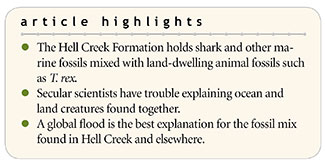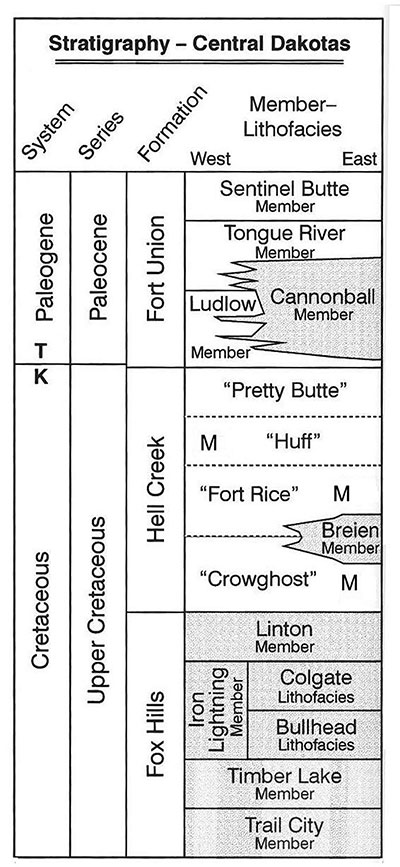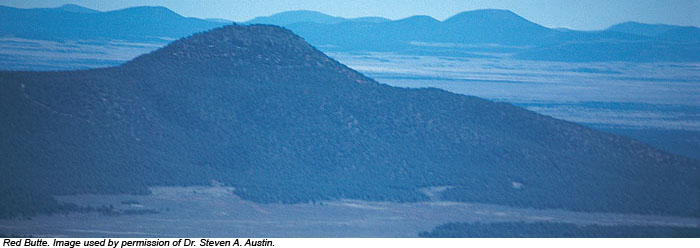 Recently, a new species of shark was found at the site where T. rex “Sue” was extracted.1 While this didn’t surprise Flood geologists,2 it required some special pleading by evolutionary scientists to explain away another apparent marine animal in the “wrong” place.
Recently, a new species of shark was found at the site where T. rex “Sue” was extracted.1 While this didn’t surprise Flood geologists,2 it required some special pleading by evolutionary scientists to explain away another apparent marine animal in the “wrong” place.
Sue was discovered in South Dakota in a sedimentary rock unit known as the Hell Creek Formation (HCF).1 This formation also covers parts of North Dakota and Montana and resides near the top of a massive pile of sedimentary rocks called the Williston Basin.
A few years ago, I researched the HCF and showed that it was encapsulated, top and bottom, by sedimentary rocks that even secular scientists agree are marine in origin. Figure 1 shows the Upper Cretaceous and Paleogene stratigraphic units in the Williston Basin, with the marine rocks shaded in gray.3

Secular scientists have found numerous marine invertebrate fossils throughout the HCF.4 Using the informal subdivisions identified by earlier scientists,5,6 they determined there were marine fossils in three of the four subunits (shown by the letter “M” in Figure 1). Brackish-water and marine bivalves called Crassostrea (oysters) and Corbicula (clams), gastropod Pachymelania (snails), and the crustacean trace fossil Ophiomorpha were common throughout the formation.
A variety of animal groups are found in the Upper Cretaceous HCF and in the overlying Paleogene Fort Union Formation.3 The data show multiple examples of mixed land, freshwater, and marine influences in the upper HCF. These results mesh well with the marine influence found in North Dakota.4
Surprisingly, in two volumes of papers published on the HCF in the last 20 years, little is mentioned of the occurrences of five (now six) species of sharks, the 14 species of fish, and the bivalves that indicate a marine influence on the formation.7 Secular scientists either ignore these findings4 or dismiss them as freshwater sharks and fish,1 in spite of the more reasonable conclusion that they represent marine organisms.
The bottom line is that the Fox Hills Formation directly below the HCF is accepted as a marine deposit (Figure 1), and the unit immediately above the HCF, the Cannonball Member of the Fort Union Formation, is accepted as a marine deposit, yet Hell Creek itself is claimed to be terrestrial solely because it contains dinosaur fossils. But it’s filled with marine fossils from top to bottom.
This is nothing new for the global rock record. We see this same fossil mix across all continents. Even most European Cretaceous dinosaurs are found not just mixed with marine fossils but in actual marine rocks like chalk and limestone.8 Spinosaurus, the largest theropod dinosaur ever discovered, was found in Morocco with car-size fossils of coelacanth fish, which today are only found in the deep ocean.9
A global flood is the best explanation for the fossil mix found in Hell Creek and elsewhere. ![]()
The best explanation of the mix of land and marine organisms is not fluctuating sea levels as most secularists claim, but a massive global flood that covered all the continents just as Genesis describes.
References
- Gates, T. A., E. Gorscak, and P. J. Makovicky. New sharks and other chondrichthyans from the latest Maastrichtian (Late Cretaceous) of North America. Journal of Paleontology. Published online on Cambridge.org January 21, 2019.
- Thomas, B. A T. rex Swimming with Sharks? Creation Science Update. Posted on ICR.org February 19, 2019.
- Clarey, T. L. 2015. The Hell Creek Formation: The Last Gasp of the Pre-Flood Dinosaurs. Creation Research Society Quarterly. 51 (4): 286-298.
- Hartman, J. H. and J. I. Kirkland. 2002. Brackish and marine mollusks of the Hell Creek Formation of North Dakota: Evidence for a persisting Cretaceous seaway. In The Hell Creek Formation and the Cretaceous-Tertiary Boundary in the Northern Great Plains: An Integrated Continental Record of the End of the Cretaceous. J. H. Hartman, K. R. Johnson, and D. J. Nichols, eds. Geological Society of America Special Papers. 361: 271-296.
- Frye, C. I. 1967. The Hell Creek Formation in North Dakota. Ph.D. dissertation. Grand Forks, ND: University of North Dakota, 411 p.
- Frye, C. I. 1969. Stratigraphy of the Hell Creek Formation in North Dakota. North Dakota Geological Survey Bulletin. 54: 65 p.
- Hartman, J. The Hell Creek Formation and the Cretaceous-Tertiary Boundary in the Northern Great Plains; Wilson, G. P. et al. 2014. Through the End of the Cretaceous in the Type Locality of the Hell Creek Formation in Montana and Adjacent Areas. Geological Society of America Special Papers 503.
- Csiki-Sava, Z. et al. 2015. Island life in the Cretaceous—faunal composition, biogeography, evolution, and extinction of land-living vertebrates on the Late Cretaceous European archipelago. ZooKeys. 469: 1-161.
- Ibrahim, N. et al. 2014. Semiaquatic adaptations in a giant predatory dinosaur. Science. 345 (6204): 1613-1616.
* Dr. Clarey is Research Associate at the Institute for Creation Research and earned his Ph.D. in geology from Western Michigan University.






















